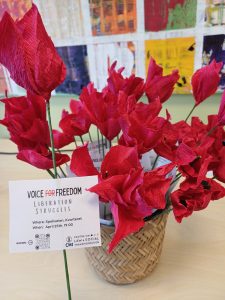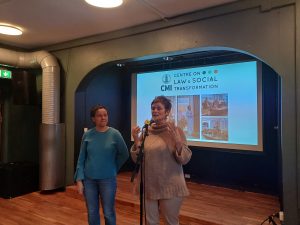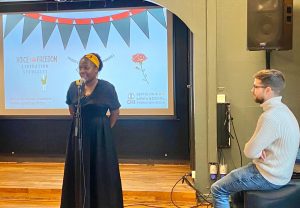Ianira Vieira (2024)
The night of 25th of April was an exceptional occasion at Kvarteret’s, as voices were heard in an evocation of freedom at the open mic session ‘Voice (for) Freedom: Liberation Struggles ‘. The date, a significant moment in history for both Italy and Portugal, was observed as we add our reflections to the commemoration.
 The Norwegian liberation narratives were articulated through the passionate words of Sámi activist Sondre, who reflected on indigenous struggles and the continuing quest for freedom. Through the piece ‘Seguramente la libertad’ by Mohamed Salem Abdelfatah, there was a presentation of reflection on Western Sahara’s continuing aspirations for sovereignty and self-determination. The event also paid tribute to the poetic courage of Portuguese women during the revolution, with a recitation of Maria Teresa Horta’s ‘Mulheres de Abril’.
The Norwegian liberation narratives were articulated through the passionate words of Sámi activist Sondre, who reflected on indigenous struggles and the continuing quest for freedom. Through the piece ‘Seguramente la libertad’ by Mohamed Salem Abdelfatah, there was a presentation of reflection on Western Sahara’s continuing aspirations for sovereignty and self-determination. The event also paid tribute to the poetic courage of Portuguese women during the revolution, with a recitation of Maria Teresa Horta’s ‘Mulheres de Abril’.
The evening intertwined the spheres of personal and political freedom. Attendees reflected on the power of music as a tool for unity in multilingual contexts and the complexities of freedom within religious frameworks. In addition, experiences of displacement, the fluidity of identity and the impact of war on community belonging were shared. A musical contribution included an interpretation of Chico Buarque’s ‘Apesar de Você’, a melody that represents the ability to persevere in the face of oppression.
 The reflections of the night were evidence of the constant struggle to sustain freedom and democracy in the context of rising illiberalism. This collection of stories, songs and poems were not simply a retrospective, they were a reminder to all of us to continue to celebrate freedom, to express freedom, and to recognise that each new day is an opportunity to fight for our liberation and freedom.
The reflections of the night were evidence of the constant struggle to sustain freedom and democracy in the context of rising illiberalism. This collection of stories, songs and poems were not simply a retrospective, they were a reminder to all of us to continue to celebrate freedom, to express freedom, and to recognise that each new day is an opportunity to fight for our liberation and freedom.
This publication is dedicated to the trans liberation monologue delivered during the event, a testament to the struggles and freedoms that are still being pursued:
Trans Liberation
By Kath J Nordbø
I work as a substitute teacher. Last year, I met a “girl” by the name of, let’s say, Thomas. She was a lively, vibrant, glittery, and incredibly bratty 10 year old. The teacher told me in a hushed voice before I headed in, that “this class has two Thomases. One of them looks like a girl. Just… don’t make a deal out of it.”
In the year after, I thought a lot about this girl named Thomas, and always with a twinge of worry – they told me “he” was fine with just being what and who he was, a boy dressed as a girl, that the parents agreed this was good, and in my mind, I counted down the years til she would probably enter puberty, til her voice would drop, her facial anatomy would change, her body would produce hair in all the masculine places. This countdown raced against the usual timeline for getting medical help from NBTK, the national treatment centre for gender incongruence: About a year in the initial waiting list. About four months between each appointment, totalling an additional one to two years. More if she shows symptoms of mental illness, such as depression and anxiety.
Last week, I was back at that school, and as coincidence would have it, back in the same class. Another teacher pulled me aside before class, whispering “we have a girl in our class, Jenny, who used to be a boy. Just… so you know.” I couldn’t help but beam with joy when I met her, now 11, her girlhood now fully accepted as such by the grown-ups around her.
Some days later, Andrea invited me to this event, and asked me if I could say some words about queer liberation and what it means to me. I felt unsure – my area of knowledge is so much more limited than most of the brilliant people here, and anyway, Norway is, by global standards, doing pretty well. Gay people can get married. They may even adopt kids. Changing your legal gender, while more cumbersome than it needs to be, is merely paperwork. I’ve kissed my ex-wife in public dozens of times, without fearing that some stranger would assault us for brazenly being queer. And Jenny is a happy girl, with her classmates seeing her as nothing else. I could, perhaps, stick with the celebratory part of this talk, I could share some optimistic notes about how far the queer liberation movement has come in Norway. Sometimes I just feel optimistic.
This optimism is a result of, primarily, two things: One, considerable privilege. Being a nonbinary person in Norway, who has a kind of “fuck it” attitude to those small daily practices of cis-het normativity, and who has never faced violence for my gender or sexual identity, my life really is all rainbows without much rain. Two, I am extraordinarily good at avoiding reading the news, as well as all comment sections.
A trans group I’m in, shared an event for tomorrow [to which yall are warmly invited]: A protest against the Norwegian state labelling gender-affirming care for people below 18 as “experimental” in a move to increasingly deny all medical treatment to them. Rikshospitalet, the monopoly holder over Norwegian public-sector gender affirming healthcare, falsely claims that there just is no evidence that medication, including puberty blockers, has any positive effect for underage trans people. The argument: “We want them to get older. We want them to mature and to explore their identity over time. […] It is important to take time and not hastily begin treatment that is irreversible.”
The heads of NBTK, the national treatment centre for gender incongruity at Rikshospitalet, have come with similar (and arguably worse) statements before – in 2018, an article published by head practitioners Anne Wæhre and Kim Alexander Tønseth raged against private sexologists “treating the nation’s daughters to hair growth” and reducing national fertility rates by treating adolescents who were denied treatment from Rikshospitalet. The move to formally label all gender-affirming and puberty-delaying medication as “experimental” is part of a general pattern of transphobia and pathologization of trans and gender nonconforming identities. Having Anne Wæhre as leader of NBTK, is like having Marlboro lead the Norwegian Cancer Society. The hostility facing trans people is not a societal symptom of right-wing arseholes spending too much time in Facebook comment sections – it is institutional and nationally sanctioned.
This can be easy to forget from an outside perspective. We have made important strides in queer rights, and as a society, we have become far more accepting and open-minded than before. Especially the gay community has fought tooth and nail for rights and dignity, and we need to celebrate all the advances made. But as I prance around in rainbow flags and this cap all I want without feeling in danger, Jenny might well be forced to grow up into a body that is alien and disgusting to her, being denied treatment from the only public health service available to her for at least another seven years, maybe forever. About a third of trans people get rejected from Riksen. Queer people must remember to fight together – gay people cannot be complacent with the valuable strides they have made – a rainbow ain’t a rainbow if it lacks half its colours.

